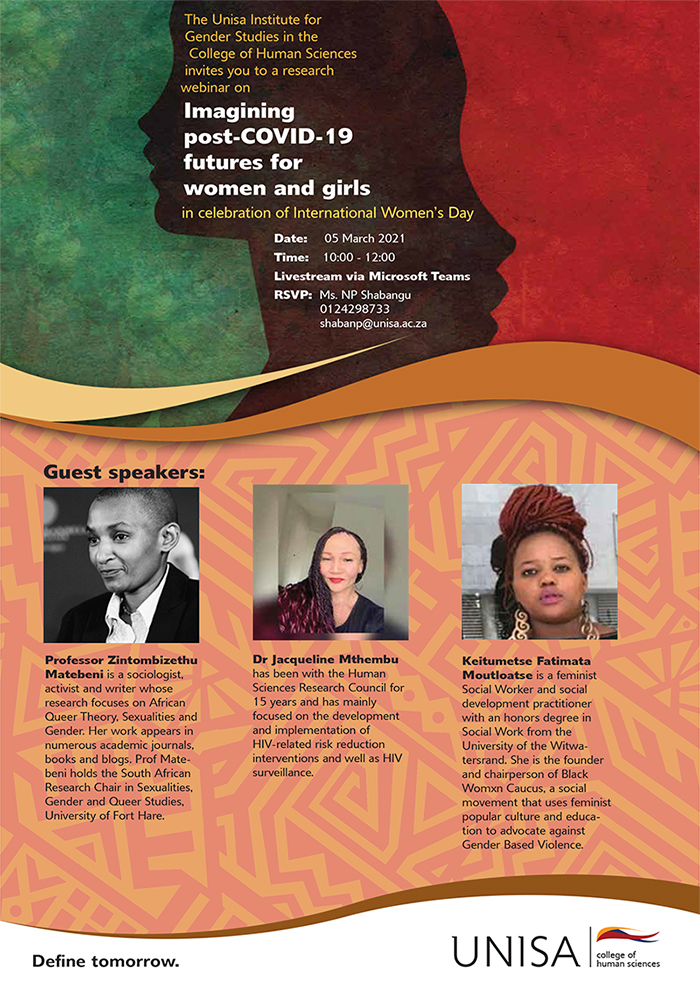
The African college of excellence in the social and human sciences
The Institute for Gender Studies in the College of Human Sciences hosted a webinar on 5 March 2021 commemorating International Women’s Day and themed "Imagining post-Covid-19 futures for women and girls". The reflective and thought-provoking event brought together distinguished gender scholars, gender workers and gender activists to share their work and how it has been challenged by Covid-19.
Panellists contributed to helping attendees think through and reflect on the ways in which women and girls have been disproportionately affected by gender-based violence (GBV) during Covid-19. The speakers also acknowledged that, apart from the devastating impact the pandemic has had on women and girls, women have also risen to the occasion to develop adaptive and creative responses to both the medical pandemic and the pandemic of violence.
Prof Nokuthula Mazibuko, the Head of Unisa’s Institute for Gender Studies (IGS), began her address by encapsulating what the word "woman" means to her. "When I define woman, I am referring to that particular woman in the rural Eastern Cape, rural KwaZulu-Natal or that woman sitting in the boardroom being the 'wrong' gender, sexuality, race or cultural background." Her opening address highlighted that, apart from all the emotional and physical pain women in the world face, they continue to show bravery and be at the forefront of the battle against the pandemic as front-line workers, caregivers, scholars, scientists and activists.
After Mazibuko’s opening address, Siphesihle Jojo, an afro soul musician, serenaded the panellists and attendees with an original song entitled "Who will tell our story". The song "emphasises the need to tell our unique stories as black women and black people in general," said Jojo. She then closed the webinar with another original musical item entitled "Ndiyanyamezela", a song about a single mother and her struggles. Her musical items were not only relevant for the celebration of International Women’s Day but also demonstrated the multiple ways, such as the arts, within which we can memorialise and tell our stories.
Prof Zintombizethu Matebeni, a sociologist, activist and writer, whose research focuses on African queer theory, sexualities and gender, started the session with an emotive presentation on the experiences and daily realities of both heteronormative and queer women and the need to include both as we reimagine a post-Covid-19 future. Her departure point was that "woman" is a limited category trapped between a binary and that these binaries exist and thrive to form boundaries and problematic fundamentalisms. Women are currently "imagining freedom in the present"; we move between spaces and time, being in-between here and there. Matebeni’s conclusion asserts that "there is a fallacy about black women; they are resilient, regardless of any strike or force that comes their way. They always bounce back from hardship, oppression or injustice. Through self- denial they survive."
Following Matebeni’s emotional presentation was Dr Jacqueline Mthembu, a scholar whose work has mainly been on the development and implementation of HIV-related risk reduction interventions and HIV surveillance. She gave a detailed presentation of some of her work that focuses on sexism, intimate partner violence, coloured masculinities, coloured women, risk behaviour amongst men and alcohol-HIV-AIDS prevention in South Africa.
In her talk, Mthembu said that through her studies she found that it is crucial that we engage men in combating intimate partner violence and address violence contextually. The lack of consistency in definitions influences development instruments of GBV and how national and local government respond to violence. As we reimagine post-Covid-19 futures for young women and girls, we are called by Mthembu to consider more closely and critically "coloured" women’s experience.
Last to speak was Keitumetse Fatimata Moutloatse, a feminist social worker and founder of feminist activist and feminist organising space, Black Womxn Caucus. She began her talk by taking participants through a timeline of social movements led by women in South Africa from and during apartheid to post-apartheid. Throughout her presentation, she reiterated the need for young women and girls to take up space in a male-dominated society.
In response to Covid-19, Moutloatse and Black Womxn Caucus established the Crisis of Care WhatsApp Helpline in response to increased demand for free, accessible, psychosocial support for women in South Africa. Moutloatse concluded her presentation by beckoning us to recognise that, with violence being contextual, it is therefore "important that we do not always create universal approaches to addressing violence but, instead, we allow those who are disempowered and at the receiving end of violence to be in the forefront of finding solutions that will help address violence they experience in various ways."
The two-hour seminar concluded with a question and answer session that created robust interaction between the panellists and participants.
* By Ngowenani Nohayi, Assistant Researcher, Institute for Gender Studies

Publish date: 2021-03-26 00:00:00.0